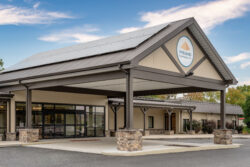What Should My Residential Treatment Include?

Enrolling in residential treatment can be intimidating – not only does residential treatment mean living in the facility itself, but it also means a complete lifestyle change for the men and women who are pursuing recovery. Not only do they need routine supervision and personalized care, they need to feel safe and confident in their treatment.
For this reason, it is important to find a treatment facility that meets every single one of these needs—which may sound like an intimidating task. But the truth is, the more comfortable you feel in recovery, the more likely you are to see it through to the end.
What is residential treatment?
When it comes to addiction recovery, residential treatment is one of the levels of care in treatment designed to help you move from an unhealthy lifestyle of addiction and poor coping mechanisms to one of freedom and balance. It is one of the more intense forms as it requires you to be a resident within the treatment facility, receiving supervision and more intensive care.
Residential treatment usually falls between detox – where you physically detox your body from substances like drugs and alcohol – and outpatient treatment – where you continue treatment but commute to and from the treatment center daily.
What do I need to look for in residential treatment?
There are countless residential treatment facilities offering services to those who need them. But when looking for the right one, you must ensure the treatment facility you select is designed to meet your needs. By taking the time to determine your personal goals first, you can make sure the treatment facility you select can meet those goals.
Pyramid Healthcare has designated treatment facilities throughout the eastern United States, including West Virginia for our local WV clients. If your goals align with our facility’s personalized program options, it may be worth exploring what Pyramid Healthcare can offer you.
Comprehensive levels of care
When recovering from a substance use disorder or other mental health condition, you want to make sure the levels of care are appropriate for meeting your goals. Consider treatment programs offering:
- Substance use assessments/evaluations used to create personalized care plans
- Medication-assisted treatment (MAT) offerings, where medication is utilized to stabilize cravings, urges and withdrawal symptoms
- Individual, family, and group psychotherapy, where counseling is used to address the impact of the addiction on the client and their loved ones
Covering all areas makes it possible to pursue recovery and find healing comprehensively.
Holistic treatment approach
Holistic treatment involves treating the whole person, body, and mind. Certain modalities, such as yoga, equine therapy, and meditation, are used in conjunction with traditional talk therapy and other similar methods to help promote overall recovery.
Additional methods used include:
- Group and individual therapy – Transformative therapeutic sessions with experienced clinicians
- Recreational outings – Activities that promote wellness and joy
- Connection with community 12-step groups – Strength through community support
- Life skills training – Equipping clients with the skills to maintain a sober lifestyle
A staff that prioritizes expertise and compassion every step of the way
Teams comprised of skilled addiction therapists, physicians, social workers, and peer recovery support specialists help to make the recovery process as smooth and as seamless as possible.
At the start of admission, experienced staff members collaborate to conduct an initial assessment and develop an optimum care plan tailored to your needs. Intake assessments comply with various requirements, including court evaluations and primary care provider consultations.
Innovative treatment methods
Incorporating dialectical behavior therapy (DBT) and other evidence-based treatment models provides a highly effective multidisciplinary treatment approach. Medical management is also used as needed to help with symptoms potentially needing more intervention than talk therapy to help reduce the relapse rate.
Family-focused recovery
With the understanding that addiction affects the whole family, it is important to find a treatment facility that prioritizes family therapy and education initiatives and collaborates with local agencies to support loved ones in reconciling and recovering together to foster a healthier, unified future.
Look for insurance coverage
There’s no denying that residential treatment can be financially difficult to cover. For this reason, it is important to search for a facility that accepts insurance. At Pyramid Healthcare in WV, we are in-network with various insurance providers, including Aetna Better Health, Medicaid, The Health Plan, Unicare, and WV Public Employees Insurance Agency (PEIA), ensuring accessible care for many.
The full continuum of care
A full continuum of care allows clients to continue receiving care in an outpatient setting even when they have moved on from the need for highly structured programs or are stepping down from a residential level of care. This continuum of care allows you to continue pursuing recovery and receiving support at an appropriate level to your stage in recovery.
Ready to start your recovery journey?
At Pyramid Healthcare we are pleased to offer our West Virginia residents the chance to receive the full continuum of care, starting with residential addiction treatment. If you believe this treatment will best benefit your recovery goals, contact Pyramid Healthcare at 888-461-7426 or online to learn more.









